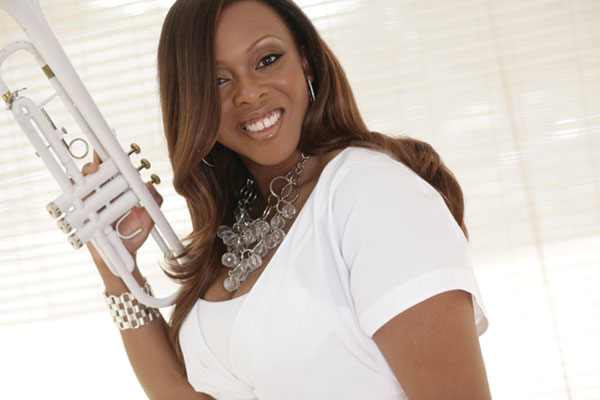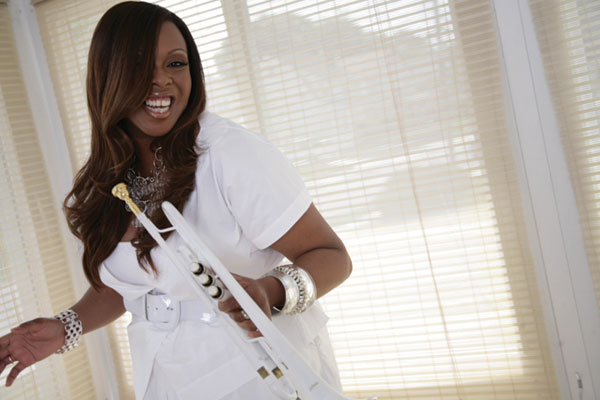She's known on the gospel circuit as "The Trumpet Lady," but Syreeta Thompson is much more than that. She's toured and worked with Beyoncé and Tito Puente, and her circle of friends and mentors includes legendary gospel performer Dorinda Clark-Cole and equally legendary bandleader, trumpeter and composer Wynton Marsalis, whom Thompson calls "one of my musical fathers." Along with counterparts Mary Halvorson (guitar) and Esperanza Spalding (bass/vocals), Thompson is one of several emerging female artists who stretch jazz's boundaries and can attract fans and listeners from other idioms with their flexibility, versatility and charisma.
The release show for her second album, In His Presence, is one of several related events scheduled to concur with the 26th annual Stellar Awards on Saturday, an event that makes Music City a center of gospel music activity. (More information is available at www. stellarawards.com.)
A rousing singer and dynamic soloist, Thompson has a foot in each of two divergent, yet related and important musical camps. On the spiritual side, she's among the growing contemporary crew whose compositions have a traditional spiritual bent and tone lyrically, but with ambitious, even adventurous arrangements. On the jazz side, Thompson's as gifted as any top brass soloist in terms of range, technique and breadth of knowledge — she's fluent in every jazz idiom from swing to the avant-garde — but she's always conscious as an arranger and composer to make certain not to craft anything that rings sour to a gospel listener's ear.
Thompson honed her love for jazz and gospel in New Orleans, where she became a friend and confidante of both Marsalis and Terence Blanchard.
"Their approach to the trumpet has been very much an influence on me," she says. "Wynton and Terence when they play get that roughness, that edge in their tone and sound that's warm and close to the voice, and that's one of the things I like to do in my playing."
Examples of Thompson's flamboyant, innovative works can be heard throughout In His Presence. The title track pairs her with Clark-Cole, who will also join her on this show, and they make a sparkling duo. The same is true for "Make A Way," with Dwayne Woods, another special guest. The exuberant beat and dashing pace of "Church Medley" bring the infectious energy of vintage brass bands into the spiritual sector and reflect her New Orleans background, while "You Still Love Me" is a soulful and passionate devotional.
Thompson currently divides her time between playing weekly with the famed Love Fellowship Choir under the leadership of Bishop Hezekiah Walker and being department chair of instrumental music at the Cecily Tyson School for Fine Arts in East Orange, N.J. Thompson holds a bachelor's in music from Rutgers and a master's in film scoring/jazz composition and arranging from New York University, and says the combination of academic training and practical experience is another thing that's becoming commonplace among contemporary jazz players.
"You have to have experience to get your own sound, to develop an idea of what you want to do and where you want to go as a musician, but the academic background is great for really learning the instrument. That was another thing I learned from Wynton, not to be afraid of classical music or of integrating that into my own work. He's done fantastic pieces for ballet and written symphonies, and that's now something I'm working on in a gospel vein. I've previously written a symphony score based on 'Lift Every Voice and Sing,' and I think that the symphonic and gospel forms work well together, just like the jazz and gospel sounds can work together as well."
To explain where she's coming from, Thompson says, "I grew up playing in the church, and in fact my mother wouldn't get me a horn until I promised her that I would faithfully practice and also play regularly in services, so I know the way gospel works in terms of structure." That structure isn't always a good fit for the more adventurous aspects of jazz: "With gospel, you inject the jazz flavor but you work off more basic rhythms and you don't get as outside with your arrangements. There aren't a lot of gospel songs written in 6/8, for example." But in Thompson's view, there's at least one feature unifies them.
"The ability to swing also is something that's very much part of jazz and gospel, though expressed in very different ways," Thompson says. "The exuberance that you feel when you get the spirit, and the energy that comes when you're really feeling the beat aren't the same thing necessarily, but they are connected in that both are related to getting inside the music. There are times as both a singer and a trumpeter when you can tell that you've really gotten to the essence of something musically, though the lyrical direction in a gospel song will always be different. But I think that you do have a lot of similarities that people sometimes miss in gospel and jazz."
Email music@nashvillescene.com.






